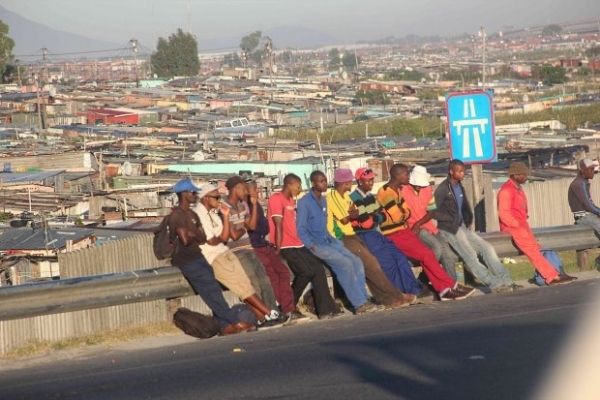

Groups of men waiting on roadsides for work is all too common a sight across South Africa. Archive photo: Masixole Feni
28 February 2019
Unemployment is South Africa’s biggest problem. And it’s not just a matter of statistics: every one of the 6.1 million people who are unemployed at present has a story to tell.
We’ve tried to tell a few of those stories over the last two weeks, and we’ve published analyses by economists of the causes of the problem and possible solutions.
More than one in four people who want to work cannot find any. Officially, unemployment has increased over the past decade from 21.5% to 27.1% of the working-age population, one of the highest rates in the world. If you take into account people who have given up looking for work, the unemployment rate is even higher; 37%.
In manufacturing alone, some 300,000 jobs have been shed over the past decade.
As Minister of Finance Tito Mboweni said in his budget speech, South Africa is a small, open economy. South African manufacturers compete against not just each other but against the whole world. In the clothing and textile industry, for example, the number of people employed has declined from about 150,000 in 1996 to less than 80,000 in 2016. South African manufacturers struggle to compete with those in China, Bangladesh, and increasingly even Lesotho, where garment workers are paid very low wages.
Should wages in South Africa be lower in order to compete? Some economists argue that rising wages in South Africa have come at the expense of job creation.
But others warn that in many families a single wage earner supports many unemployed adults, and in the absence of a better social security net, these wages are critical to household survival. Though South Africa does have a sophisticated social grants system, the grants are very low, and many people — who are not disabled or elderly or parents — get no grant at all.
The solution does not lie in agriculture or mining. Farm jobs have stagnated over the past decade, and mining — the industry on which our economy was built — has shed 65,000 jobs. This has happened while mining output has increased; part of the reason for this being automation.
One thing economists agree on is that poor education policies are a big part of the problem. There are in fact jobs available in South Africa — if you’re qualified. Only 1.7% of the country’s unemployed are graduates. Many of these graduates have been absorbed by the financial sector, which has created over 620,000 jobs since 2008.
What does seem to be clear is that major interventions are necessary. The status quo is not creating jobs. Even in periods when South Africa’s economy was growing much faster than the 1.5% predicted for 2019, job creation was not fast enough to mop up unemployment.
Unemployment destroys people’s health and self worth. Finding ways to fix our biggest problem should be the top priority of government.